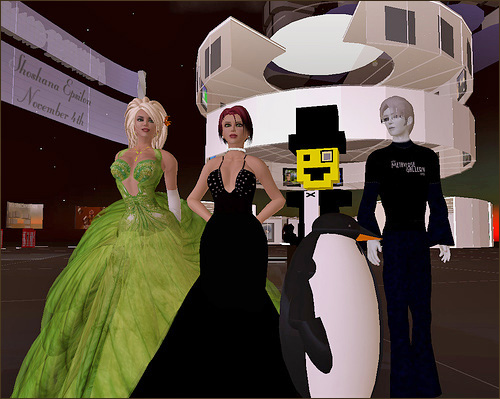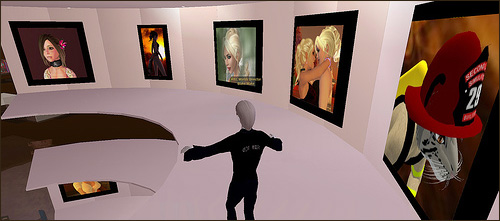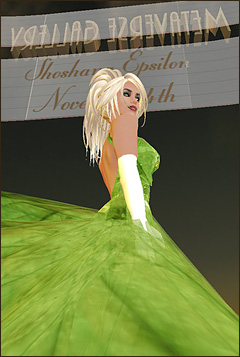Metaverse Gallery in Second Life - Notes from the Opening

The Metaverse Gallery in Second Life opened this weekend. It was the most fun I think I’ve ever had at an art opening. It was very well attended.
A lot of people go in to Second Life, walk around a bit, look at all the ugliness, porn, gambling, and then say something like “I tried it but it was boring.” And for the most part, they are right. A lot of these people are used to games, where the expectations and rules are set. In Second Life you have to work pretty hard to make compelling places and created meaningful events. And that’s just what the Worlds Lab team did - they worked really hard for several months.
The Metaverse Gallery in many ways is the culmination of a series of Online Worlds courses and research that has taken place over the last year at UT Dallas. What we’ve come to is the idea that Second Life is an awkward, temporary, highly flawed, difficult, very early version of
something that will evolve in a most painful manner into an immersive 3D metaverse. At the moment, it’s the only place to really test out ideas about how to do things other than games in participatory 3D spaces. And I’ve been adamant in my belief that in very short order the non game 3D shared spaces will eclipse the game spaces. This is where a lot of people have it wrong in thinking that the game spaces will expand and merge somehow. Not a chance. But that’s a different topic I’ve written about elsewhere.
For us, we’ve given a lot of thought to the the structures themselves, and what kind of art work we wanted to show. Our view, hotly debated in SL circles, is that rather than just dumping things from the physical world in to SL we need to build environments that suit the structure and rules of the online world itself. The same thing goes for the art - why scan in things from the 1st world or from the 2D Internet when you can show work made in world?

The Metaverse Art Gallery is basically an example of our thinking. We chose to build a floating platform without stairs or other gravity dependent details. Some of the walls are transparent from one side and opaque from the other - try that in fleshspace. The entire structure floats on a semi-transparent platform. For the inaugural artist, we chose someone who is an artist in SL, and makes her work there. In some ways she is very traditional - she makes portraits of other avatars. It is very accessible work, which is also on purpose. Obtuseness for its own sake helps no-one.
The building will evolve over time as our team, their skills, and our thinking matures. In this show we included a small area where chat conversations are re posted Jenny Holzer style on the floor. A kind of reactive public sculpture. We’re also talking a lot about dynamic architecture (or really, dynamic UI). Most of the structures on the island will eventually incorporate dynamic elements that respond to several kinds of inputs: avatars in the immediate surroundings, in world data such as time and communications, and external web data such as database feeds from RSS and XML (stock market, weather, blog entries, flickr postings, etc). All of these combine to do what is impossible in the 1st world: structures that change dynamically based on a set of external conditions.
We’re thinking a lot about these and other ideas and the experiments that we are doing can be viewed in real time in the research area on the island. One of the projects is, at the moment, called “the proximity noodle.” It’s a pretty simple set of objects that bend toward you when you approach. Now on the one hand I despise “gee whiz” art - art basically art made to demonstrate some technical achievement. There’s quite a bit of this in SL - “sculptures” that wave around in the “wind” for example. You look at them and say to yourself “gee whiz!” And that’s the end of it.
And while we may get close to geewhiz art in the coming months I hope we push it well beyond and into expressiveness, or simply play. I think some of the work in metaverse spaces will be more about mature play and surprise than the contemplative befuddlement you see visitors engaged in inside many a traditional art exhibit. This is important, because even though these places are not games, the element of experimentation and play is certainly present. We don’t want to have to pretend to be serious. If there is any place to knock some holes in the often elitist, noxious air of contemporary art it is here.
 We intend to continue to develop and take seriously the idea that the conventions of the metaverse are far from developed. Some have come from gaming, the rest are in development, and mostly invisible. One thing that is not helping is all the corporations and educational institutions building real world structures in Second Life. It’s seriously missing the point, and I think all the new design firms who are doing all this building need to do some client education.
We intend to continue to develop and take seriously the idea that the conventions of the metaverse are far from developed. Some have come from gaming, the rest are in development, and mostly invisible. One thing that is not helping is all the corporations and educational institutions building real world structures in Second Life. It’s seriously missing the point, and I think all the new design firms who are doing all this building need to do some client education.
The opening was a first, and really felt like something. This is the bar for 3pointD space events. Most of them are just frustrating, stupid, or, as many have found, boring.
But if you want a meaningful experience, you are going to have to create one.
Here’s some reference links:
Go to The Metaverse Gallery Now (Second Life required), or check out the pics on flickr.
Press Coverage:
SLNN posted this review of the event, and the Dallas Morning News ran a story on it as well, excerpt of it is here. There was also a bit in Glass Tire, and my friend Dennis Hollingsworth gave us a visit (a little early!)
Artist: Shoshana Epsilon | UT Worlds Lab Team members Christi Nielsen (”Juliette Cordeaux” who curated the show) Russell Smith (”Rusmi Taka”), Jeff Martini (”Jerry Tones”), & Steve Petterborg. More about the lab at UT Dallas Online Worlds Lab.